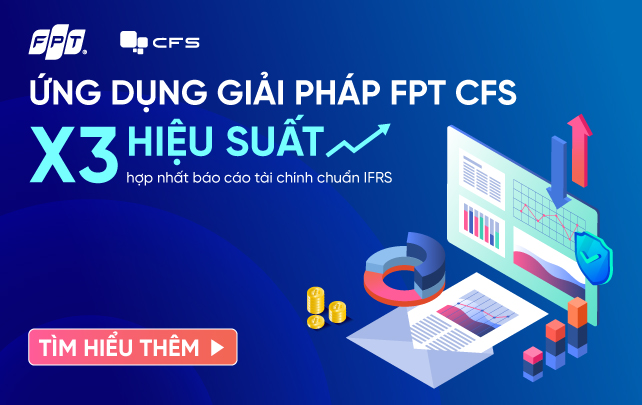IFRS standards are international financial reporting standards being applied by 166 countries and territories. IFRS is considered a common financial language, helping businesses communicate and do business with each other more conveniently and easily. Faced with the general trend of world finance and global economic integration, Vietnamese businesses cannot ignore the IFRS conversion trend.
Benefits of applying IFRS standards in Vietnam
IFRS is a common language used globally, helping businesses understand and compare useful information about other businesses in the same industry in different countries. The application of IFRS creates conditions for businesses to list on international markets and receive preferential loans from international financial institutions such as the World Bank and the International Monetary Fund. IFRS provides the legal framework for accounting for financial instruments, assets and liabilities at fair value, enhancing comparability and transparency of financial reporting.
For enterprises with foreign direct investment (FDI) whose parent company uses IFRS, applying IFRS is a mandatory requirement to serve the consolidation of financial statements at the parent company. IFRS compliance helps increase capital market efficiency, promote cross-border investments, fair competition and create investor confidence. This not only increases business competitiveness but also contributes to the sustainable development and transparency of the global financial market.

Challenges when applying IFRS standards in Vietnam
The financial market and capital market have not developed commensurate with their potential
IFRS has the goal of representing and recording financial transactions in developed economies with many complex financial instruments. Meanwhile, Vietnam’s financial and capital markets have not developed commensurate with their potential and do not have enough financial tools. This leads to difficulties when applying IFRS.
Businesses do not want to disclose their financial situation
When applying IFRS, financial information will be more accurate and more reliable with improved accountability of businesses. This makes it difficult for inefficient businesses to have positive financial statements like the present. Poorly performing businesses are afraid of affecting stock value, ratings and maintaining listing conditions on the stock market.
People and language
People are the key factor determining the success of converting IFRS standards. However, human resources trained in these accounting standards in Vietnam are limited. Vietnam has a large shortage of human resources with skills, accounting skills and IFRS application. In addition, IFRS is drafted in English, while most Vietnamese accountants, auditors, investors and businesses have limited English. Therefore, accurately understanding terminology, updating news and applying IFRS in Vietnam will also be difficult.
Overlapping legal documents
Vietnam has 3 legal documents that impact the financial work of businesses, including: Tax policy, financial reporting standards and financial mechanisms. This creates inconsistency and overlap in application. Therefore, applying IFRS in Vietnam will face many difficulties.

>> Read more: Doanh nghiệp cần cân nhắc gì khi chuyển đổi IFRS
Types of IFRS standards for international financial reporting IFRS
IFRS standards include 16 different standards. In which IFRS 17 standard is updated and replaced IFRS 4. Below is a list of IFRS standards:
IFRS 1: First-time Adoption of international Financial Reporting Srandards (First time applying IFRS)
IFRS 2: Share-based Payment (Payment based on shares)
IFRS 3: Business Combinations
IFRS 5: Non-current Assets Held for Sale and Discontinued Operations
IFRS 6: Exploration for and Evaluation of Mineral Assets
IFRS 7: Financial Instruments: Disclosures (Financial Instruments: Presentation)
IFRS 8: Operating Segments (Business segments)
IFRS 9: Financial Instruments (Financial Instruments)
IFRS 10: Consolidated Financial Statements
IFRS 11: Joint Arragements (Joint Venture Agreement)
IFRS 12: Disclosure of Interests in Other Entities (Disclosure of interests in other entities)
IFRS 13: Fair Value Measurement
IFRS 14: Regulatory Deferral Accounts (Regulatory Deferral Accounts)
IFRS 15: Revenue from Contracts with Customers
IFRS 16: Leases
IFRS 17: Insurance Contracts
To properly appreciate the importance and complexity of converting financial statements according to IFRS international standards, businesses will be fully prepared in terms of resources and staff training to help the company. not only complying with new legal requirements but also being autonomous in measurement and reporting, increasing information transparency, and gaining the trust of investors and partners.
FPT CFS – Comprehensive financial statement consolidation solution for businesses
FPT CFS is a comprehensive software solution that simplifies the financial reporting process;Automates up to 99% of the work of preparing and consolidating financial reports, allowing data integration from many different data sources, ensuring accuracy and compliance with accounting standards (including VAS and IFRS ). The solution helps Board of Directors gain real-time insight into the financial situation, promoting better decision making, freeing up resources to focus on strategic or impactful financial tasks. great benefit.
FPT CFS solution is suitable for corporations with many member units or multiple levels of member units, businesses that wish to improve the efficiency and accuracy of financial reporting and departmental reporting. Finance wants to reduce manual operations and reduce workload. FPT CFS is a product from a reputable brand, fully capable of consolidating financial reports with many superior features and high security to ensure information security standards and customer data.
Read more here
Source: Viet Nam Economic News












